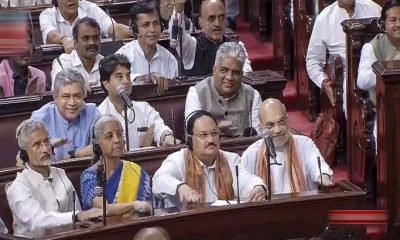Restrictions on Laptop Imports: Promoting Local Manufacturing, Restricting Choice or a Jio Connection?
Coupled with the launch of Reliance’s Jio laptop, the move raises questions about the implications of protectionist policies and its potential monopolistic motives.
Modi government, in a surprising step, has imposed restrictions on the import of computers and laptops. According to a Ministry of Commerce and Industry notification, importers must obtain licenses before bringing laptops, tablets, personal computers, and other electronic devices into the country. This move comes as part of Modi’s ‘Make in India’ campaign, aimed at promoting domestic manufacturing to boost job creation and reduce dependence on imports.
The Unignorable Reliance Jio Connection
With India’s electronic imports reaching $19.7 billion from April to June, the government’s recent decision to impose restrictions on laptop and tablet imports has sparked debates and raised concerns about its impact on consumer choice and the tech industry. Coupled with the launch of Reliance’s Jio laptop, the move raises questions about the implications of protectionist policies and its potential monopolistic motives. The policy at the outset appears to be a move from a movie where the system works for the oligarchy to flourish.
The timing of the laptop import ban raises eyebrows due to the concurrent launch of Jio’s laptop. Jio, a dominant player in the Indian telecom industry, has a reputation for disrupting markets and leveraging its vast resources to enter new sectors aggressively. With these restrictions on laptop imports, Jio stands to gain, potentially paving the way for easy entry. While global players like Apple, Samsung, HP, Dell, ASUS etc., manoeuvre through the entirety of this restriction policy which needs to be fully understood.
A Blow to Free Market Principles & Customer Choice
The intended restrictions on laptop imports are an example of a protectionist policy which undermines the principles of a free and open market. By restricting imports, the government is essentially creating barriers to international competition, hindering access to a variety of laptop and tablet offerings with varying features and price points. Free markets encourage healthy competition, leading to better products, lower prices, and increased consumer choice.
Shortcuts over a Glocal Mindset?
Rather than restricting imports, the government should focus on promoting skill development and supporting domestic manufacturing through investments in research and development. A thriving tech industry requires a skilled workforce to innovate, design, and manufacture products that compete globally. Emphasising skill development would benefit India in the long run, making it a formidable player in the global tech landscape.
Promoting local manufacturing does not have to come at the expense of global players. Encouraging international tech giants to invest in local manufacturing facilities can be a win-win situation. Such investments can create jobs, transfer technology, and spur the growth of the Indian economy while retaining consumer access to global products.
Fostering Domestic Manufacturing: A Step Towards Self-Reliance
India’s push for local manufacturing comes at a pivotal moment, as companies worldwide seek alternatives to China to secure critical supply chains. With a young population looking for jobs, India’s demographic dividend presents an attractive opportunity for global companies seeking alternative manufacturing hubs.
Several international companies have already started investing in India’s manufacturing sector. For instance, Apple is reported to be producing some of its products in the country, with plans to increase domestic manufacturing by up to 25%.
US chipmaker Micron recently announced a significant investment in Gujarat semiconductor assembly and test manufacturing facility. Foxconn, a key Apple supplier, is also looking to expand its manufacturing operations in India.
Despite a recent setback in exiting a joint venture with Vedanta Group, Foxconn remains committed to investing in Indian chipmaking and is exploring government programs that subsidise the cost of setting up semiconductor or electronic display production facilities in the country.
Overall, India’s move to restrict laptop imports can be seen in line with its broader economic strategy to bolster domestic manufacturing and enhance its position as a competitive manufacturing hub. However, as the tech industry evolves, it remains imperative for India to strike a balance between promoting domestic manufacturing and ensuring a diverse range of technology options for consumers. With a vast and growing market, India has the potential to become a key player in the global tech landscape, attracting more investments and creating job opportunities for its workforce.
Instead of resorting to protectionism and stifling international competition, policymakers should prioritise fostering a competitive environment that encourages innovation and benefits consumers.
Disclaimer: The views and opinions expressed in this article are those of the authors and do not necessarily reflect the official policy or position of the publication










































